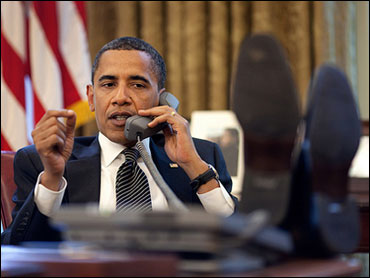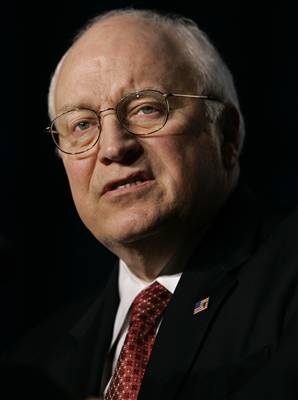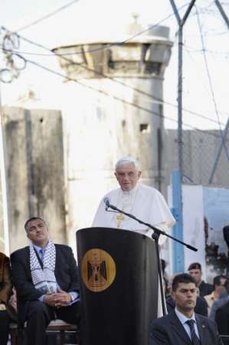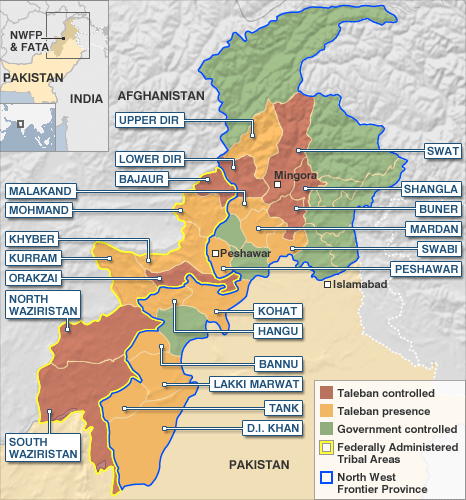Netanyahu failed to build bond of trust with Obama
Three weeks after Benjamin Netanyahu returned from his visit to Barack Obama, there is no longer any doubt that the prime minister has failed in his most important mission – to build a bond of trust with the U.S. president. The signs are clear: Israel and the United States are trading messages through speeches and headlines instead of through discrete consultations. Netanyahu is convinced that Obama is seeking a confrontation with Israel, while the president and Secretary of State Hillary Clinton are publicly demanding that the prime minister change his political stripes, just as his predecessors Menachem Begin, Ariel Sharon and Ehud Olmert did.
 A photo released by the White House, which shows Obama talking on the phone with Netanyahu on Monday, speaks volumes: The president is seen with his legs up on the table, his face stern and his fist clenched, as though he were dictating to Netanyahu: “Listen up and write ‘Palestinian state’ a hundred times. That’s right, Palestine, with a P.” As an enthusiast of Muslim culture, Obama surely knows there is no greater insult in the Middle East than pointing the soles of one’s shoes at another person. Indeed, photos of other presidential phone calls depict Obama leaning on his desk, with his feet on the floor. [continued…]
A photo released by the White House, which shows Obama talking on the phone with Netanyahu on Monday, speaks volumes: The president is seen with his legs up on the table, his face stern and his fist clenched, as though he were dictating to Netanyahu: “Listen up and write ‘Palestinian state’ a hundred times. That’s right, Palestine, with a P.” As an enthusiast of Muslim culture, Obama surely knows there is no greater insult in the Middle East than pointing the soles of one’s shoes at another person. Indeed, photos of other presidential phone calls depict Obama leaning on his desk, with his feet on the floor. [continued…]
Editor’s Comment — Oy vey! So the Muslim-loving US president is out to insult Israel’s prime minister!
Obama’s feet are actually pointing towards White House photographer Pete Souza, not Netanyahu. Somehow, however finely tuned the president’s multicultural sensibilities might be, I doubt that while based in Washington DC he feels obliged to follow Middle Eastern etiquette — especially when speaking on the phone to a thoroughly Westernized Benjamin Netanyahu.
No doubt the White House intended to send a message here, but rather than it being a calculated insult, I’d venture to say it was this: we haven’t forgotten the impression you made on Bill Clinton. Just in case you’re in any doubt: we’re the superpower.
As “an American official” (Rahm Emanuel, most likely) said: “We are going to change the world. Please, don’t interfere.”
You got that Bibi?
No we can’t, Israeli hardliners tell Obama as he pushes for peace
President Obama’s push for peace in the Middle East has provoked the ire of right-wing Israelis, who have launched a campaign against his initiative with the slogan “No you can’t”.
The words are a play on the “Yes we can” campaign that propelled Mr Obama into the White House.
As George Mitchell, the US President’s special envoy to the Middle East, arrived in Jerusalem yesterday he was confronted by a growing campaign against Mr Obama’s push for a halt to the construction of Jewish settlements in the West Bank. One poster depicted Mr Obama in a Palestinian keffiyeh headscarf; others made sure his full name — Barack Hussein Obama — was highlighted. One activist condemned Mr Obama as America’s most anti-Semitic president. [continued…]
Hamas political chief: Israeli settlement freeze essential
Hamas political chief Khaled Meshal said Tuesday that United States President Barack Obama’s pressure on Israel to freeze construction in West Bank settlements was an essential step toward restarting peace efforts.
The militant group – which is eager to win international acceptance of its rule in Gaza though it is shunned by the U.S. and others as a terrorist organization – has tried to sound more pragmatic since Israel’s Gaza offensive early this year.
Meshal’s endorsement of Obama’s push also included an appeal for the international community to consider Hamas a positive element in the search for Middle East peace.
“There is a new language from President Obama, but we expect real pressure on Israelis,” Meshal said. “There are demands Israel stop the settlements but this is not the price we are after … although it’s an essential step.” [continued…]
Editor’s Comment — Funny how if Hamas shows signs of moderation, reporters insinuate they’re faking it: Hamas isn’t being pragmatic; it wants to sound more pragmatic.
Imagine if Meshaal’s statement was defiant. Would AP be reporting that Hamas is trying to sound defiant?
Here’s the rule: treat every hostile statement as literal and charged with dire implications. Treat every positive statement as a ruse — an attempt to deceive a naive audience.
“I’m just a reporter,” says the wily journalist as he twists another story. Right!
Hamas: Fatah raids in West Bank hampering Palestinian unity
Egyptian efforts to heal a rift between rival Palestinian factions are being hampered by West Bank raids launched by Fatah against Hamas targets, Hamas leader Khaled Meshal said on Tuesday.
Damascus-based Meshal spoke on his first visit to Cairo for many months after Egyptian officials met leaders from Palestinian President Mahmoud Abbas’ Fatah movement, which launched the raids last week. Nine people were killed in ensuing violence in the West Bank city of Qalqilya.
The raids, whose casualties included members of both factions, had stoked fears of a wider showdown and highlighted tensions within Palestinian society over Abbas’ efforts to rein in militants under a long-stalled U.S.-backed peace “road map.” [continued…]
Palau to take Chinese Guantánamo detainees
The United States has won an agreement to transfer up to 17 Chinese Muslims from the prison camp at Guantánamo Bay, Cuba, to Palau, a sparsely populated archipelago in the North Pacific, according to a statement released by Palau to The Associated Press on Wednesday.
The president of Palau, Johnson Toribiong, said his government had “agreed to accommodate the United States of America’s request” to “temporarily resettle” the detainees, members of the Uighur ethnic group, “subject to periodic review.” Palau, the president said, would be “honored and proud” to take them in a “humanitarian gesture.”
The agreement opens the door to the largest single transfer of Guantánamo prisoners and is the first major deal on detainees since President Obama pledged soon after taking office in January to close the prison within a year. [continued…]
Editor’s Comment — So, while 306 million Americans tremble at the thought that a few men who didn’t even garner the label “enemy combatant” might be too dangerous to allow into the US, the fearless Palauans –all 21,000 of them — are willing to take the risk.
London’s Metropolitan Police accused of waterboarding suspects
Metropolitan Police officers subjected suspects to waterboarding, according to allegations at the centre of a major anti-corruption inquiry, The Times has learnt.
The torture claims are part of a wide-ranging investigation which also includes accusations that officers fabricated evidence and stole suspects’ property. It has already led to the abandonment of a drug trial and the suspension of several police officers.
However, senior policing officials are most alarmed by the claim that officers in Enfield, North London, used the controversial CIA interrogation technique to simulate drowning. Scotland Yard is appointing a new borough commander in Enfield in a move that is being seen as an attempt by Sir Paul Stephenson, the Met Commissioner, to enforce a regime of “intrusive supervision”. [continued…]
CIA stance on torture tape docs suggests Obama’s new open government era won’t materialize
It’s looking more and more like Barack Obama’s pledge to usher in a new era of openness in government may well go unfulfilled.
Yesterday, administration lawyers cited national security concerns to argue that Bush-era documents detailing the videotaped interrogations of detainees should not be released. And in the wake of that news, open-government advocates are reluctantly acknowledging that, despite Obama’s campaign promises, his approach to secrecy on issues of national security will likely not depart significantly from that of George Bush. [continued…]
Now Obama must include Iran in an axis of respect
Was it coincidence that Barack Obama scheduled his speech to Muslims last week on the eve of two closely fought regional elections – in Lebanon last Sunday and Iran this Friday? Now the “pro-western” coalition has won a narrow victory in Lebanon, some of the US president’s supporters are suggesting his timing was indeed calculated.
If so, it was disingenuous. Under Lebanon’s complex constitution the seats reserved for Sunnis and Shias were fixed, and Sunday’s result turned on the way Christians rather than Muslims voted. A majority showed their disappointment and anger with the senior Christian politician, General Michel Aoun, who aligned himself with the Shias. After the usual weeks of negotiation Lebanon is likely to continue with a national unity government, and the real task for Obama is not to discourage the victorious Sunni-Druze-Christian alliance from inviting the Shias, and in particular Hezbollah, into their cabinet. [continued…]
Every four years, in what has become a ritual of the country’s election season, Iran’s public broadcaster allots a half-hour of primetime to each of the country’s presidential candidates, to use as they see fit. Anticipation was highest for reformist candidate Mir Hossein Mousavi’s film. Not only had Mousavi earned the devotion of much of the country’s youth and its urban middle and upper classes, but it was widely considered a coup that his campaign had signed one of Iran’s most beloved directors, Majid Majidi, to direct his campaign documentary. The film — inspiring set pieces from around the country and selections from the candidate’s life devoted to service, all deftly woven with religious undertones and nationalist music — didn’t disappoint.
There were also plenty of visual reminders that Mousavi has become a vessel for the hopes of the country’s fervent population of university students — the film didn’t lack for shots of chicly-dressed, flatteringly lit young people. But as Ali, a student at University of Tehran who supports Mousavi, put it, “You get the feeling that the filmmaker was more impressive than the star.” Ali shook his head contemplating all the mistakes his preferred candidate had made in the single half-hour of footage. Recounting a scene in the film where a young man together with his toddler boards Mousavi’s campaign bus to complain about the country’s lack of equality, Ali shrieked in despair: “Why didn’t he kiss that baby?” [continued…]
At least 40,000 civilians in Pakistan’s Swat: Red Cross
Some 40,000 civilians remain in Pakistan’s troubled Swat region where they lack access to electricity and water amid a military assault against the Taliban, the Red Cross said on Tuesday.
“Every time we entered a village, hundreds of people asked for help,” said Michael von Bergen, an International Committee of the Red Cross representative who was part of a convoy delivering aid in the region last weekend.
“Those who did not leave are now desperate. They need food, clean water and working medical facilities,” he added in a statement. [continued…]

 y investigations have revealed to me — vividly and clearly — that once the Abu Ghraib photographs were made public in the Spring of 2004, the CIA, its contractors, and everyone else involved in administering “the Cheney methods of interrogation”, simply shut down. Nada. Nothing. No torture or harsh techniques were employed by any U.S. interrogator. Period. People were too frightened by what might happen to them if they continued.
y investigations have revealed to me — vividly and clearly — that once the Abu Ghraib photographs were made public in the Spring of 2004, the CIA, its contractors, and everyone else involved in administering “the Cheney methods of interrogation”, simply shut down. Nada. Nothing. No torture or harsh techniques were employed by any U.S. interrogator. Period. People were too frightened by what might happen to them if they continued.
